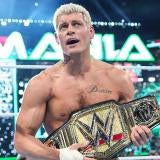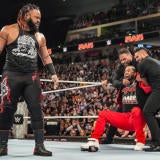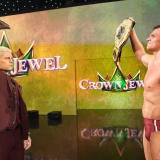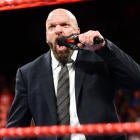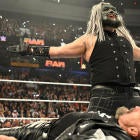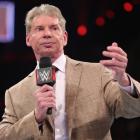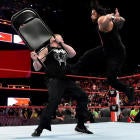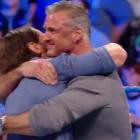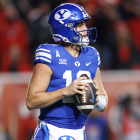As the patriarch of WWE's developmental third brand, it's not uncommon to hear 14-time world champion and executive vice president Paul "Triple H" Levesque take on a paternal tone when speaking of NXT.
From its debut in 2010 to the revamped version two years later that better resembles what fans see Wednesday nights exclusively on the WWE Network, Levesque has helped shape NXT into a product he would most want to see as a fan -- a hybrid of sorts between the gritty feel of the territory days and the electricity of the current indie wrestling style.
From booking the promotion to developing characters, Levesque does it all. He also takes pride in publicly celebrating the successes of his superstars along with them on social media.
"The Game" will place one more feather in his cap on Wednesday night when NXT airs for the first time on the USA Network, the television home of Raw and SmackDown Live, in a one-hour special (7 p.m. ET/6 p.m. PT) which Levesque calls "an opportunity for us to show what we do to the world."
This "opportunity" is technically a one-off and part of a loaded WWE Holiday Week on USA Network, which includes a two-hour Tribute to the Troops special on Thursday (8 p.m. ET). It also marks NXT's return to cable television since its 2010 launch on Syfy.
But it's not difficult to connect the dots and wonder whether this showcase opportunity is part of a larger experiment to gauge the brand's interest considering WWE is over a year removed from the expiration of its current television deal with USA Network parent company NBCUniversal.
If successful, could this "tryout" be the next step in NXT becoming an equal third brand on par with the Raw and SmackDown?
"It can be; at this point I don't know," Levesque told CBS Sports on Tuesday as a guest on the "In This Corner Podcast." "What I do know is it was a hell of an opportunity. If you look at NXT over the last few years, it has grown into something where NBCUniversal -- USA [Network], the No. 1 cable channel in America -- came to us and said we would like to take an hour of primetime and give to NXT. That's awesome.
"To me, that says a lot about the brand, where it's at, and the value of it. I'm really excited about that. We put together a hell of a show and hopefully it will be a lot of people because not everyone has been exposed to it."
As much as Levesque, 48, the son-in-law of WWE chairman Vince McMahon, badly wants NXT to be considered on the same level as the blue and red brands, he acknowledges the role it still needs to play for the overall company.
"In some ways it will always be some kind of developmental because you are always going to have new talent trying to learn their craft in that brand," Levesque said. "But over time, it will become what I think it is now -- an alternative, a third brand. This is just another step forward in that."
Levesque, who still wrestles ahead of select big events and remains a recurring authority figure on Raw, hopes to preserve how NXT acts within its own universe in terms of storylines, separate from what's taking place on WWE proper. It's a reminder of his roots having come up as a wrestler in the dying days of the territory era.
The result has been a feel -- from the booking style and in-ring style to the behavior of the crowds -- that's simply different to anything else in the company. Echoing a comment he made to CBS Sports in August that WWE's biggest competitor isn't a rival promotion like New Japan Pro-Wrestling but NXT itself for how much it has pushed the main roster to shine even brighter, Levesque also believes his brand has set in-house trends.
"Over the last few years, in some ways, NXT has changed a little bit of what Raw and SmackDown do," Levesque said. "Look at the women's revolution. I believe that there was a moment in time where fans were chanting 'Give Divas a chance' because they were seeing what could be on NXT and that transitioned forward. I think that's great.
"Anything that can push something to be better, to evolve and to become something more is a great opportunity to do that. People will often put labels on what it is. Is NXT a little bit of 'old school territory' or 'indie this or that?' I don't know. To me, I just go, 'Is it good or not?' You can put whatever label on it you want."
One thing Levesque has learned throughout the years of growing its brand is that not every NXT superstar is built to succeed on the main roster and not everyone who comes through NXT has the right tools to do their best work there. He referenced Elias, formerly known as "The Drifter" in NXT, as an example.
Levesque vividly recalled the first time he pulled Elias from the WWE Performance Center in Orlando, Florida, and brought him in for an NXT taping alongside the late Dusty Rhodes at nearby Full Sail University.
"The entire time [Elias] was there, I was trying to get him ready for Raw and SmackDown because I knew as a performer his value was there," Levesque said. "I said to Dusty [Rhodes], 'He is made for the roster and not for NXT.' The gimmick, the way he is and his demeanor, he is suited for that. He is not a fit for NXT. It doesn't mean he won't be successful there and it doesn't mean he won't have a run there but that run was to get ready for the roster."
Levesque also envisions a future for the brand where some talent would return to NXT following a run on the main roster only to find more opportunity and critical success without it being seen as a negative.
Admittedly, the part where Levesque feels most like a father in NXT is when the day comes for wrestlers he helped build to get called up.
"I still see them at Raw and SmackDown, I'm just not controlling it," Levesque said. "When they come to me now, I'm trying more to help them through the system as opposed to them coming to me for the answer. I'm trying to help them navigate a different environment and handle things and even how to have a relationship with Vince.
"But there definitely is a connection point and a paternal kind of thing. It's hard not to work with these talent and to want to see them succeed and to see the light bulb go off and to see them kind of get it, or when they come back after they have had a match or get called up, that success moment. It's easy to be jaded to it but that first time you walk out on Raw, that's real. That's a different world and the pride level to that is huge."
That feeling of helping wrestlers discover their greatness is addicting, according to Levesque, who said his good friend, WWE Hall of Famer Shawn Michaels, has discovered the same since joining NXT as a trainer.
"He has that same bug," Levesque said. "It's funny because he couldn't be at [NXT TakeOver] WarGames, he was out making a movie and it was killing him. He wanted minute by minute updates and the whole rundown of everything. You become invested in it and sometimes I am almost more nervous for those shows and the talent than I am for anything else."


